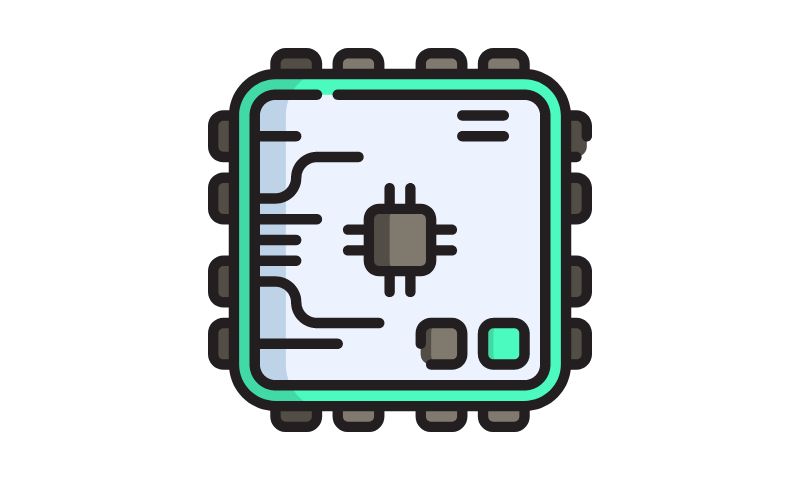Are you confused with what is rust programming language used for? If yes, then have a close look at this blog post to explore some of the major uses of rust programming.
Rust programming language has emerged as a powerful tool in the realm of software development, offering a unique combination of performance, safety, and concurrency.
Developed by Mozilla, Rust has gained significant popularity in recent years due to its ability to address the challenges faced by developers in writing reliable and efficient systems-level code.
With its emphasis on memory safety and high performance, Rust is widely utilized for a diverse range of applications across various domains. Whether it’s system programming, web development, game development, or even AI and machine learning.
Rust proves to be a versatile language capable of delivering robust and secure solutions. In this article, we will explore the wide-ranging use cases and applications of Rust programming language, shedding light on its relevance and significance in the modern software development landscape.
Rust programming language
Table of Contents
Rust programming language is a powerful and modern programming language that aims to provide developers with a safe, concurrent, and efficient way to build software.
Developed by Mozilla, Rust combines the performance of low-level languages like C and C++ with high-level language features, resulting in a language that is both expressive and reliable.
One of the key features of Rust is its focus on memory safety. It achieves this through a unique ownership system, which allows the compiler to enforce strict rules about memory management at compile-time.
This helps prevent common programming errors such as null pointer dereferences, buffer overflows, and data races. By eliminating these types of bugs, Rust enables developers to write safer and more reliable code.
Rust also emphasizes concurrency and parallelism. It provides built-in support for writing concurrent programs, allowing developers to take full advantage of modern multi-core processors.
With features like threads, channels, and lightweight tasks, Rust makes it easier to write efficient and scalable concurrent applications.
What Is Rust Programming Language Used For?
Have a close look at what is Rust programming languages used for.
System Programming

One of the primary use cases of Rust is system programming. Rust’s memory safety guarantees make it an excellent choice for building low-level software components, such as operating systems, device drivers, and embedded systems.
The language’s emphasis on zero-cost abstractions allows developers to write code that is as efficient as C or C++, while its ownership system prevents common memory-related bugs like null pointer dereferences and data races.
Web Development

Rust is also gaining traction in the web development community. Frameworks like Rocket and Actix provide a robust foundation for building web applications with Rust.
The language’s strong type system and borrow checker ensure that web developers can write safe and secure code that is resistant to common security vulnerabilities, such as memory leaks and buffer overflows.
Additionally, Rust’s performance characteristics make it suitable for building high-performance web servers and APIs.
Networking and Distributed Systems

Rust’s ability to handle concurrency and its focus on safety make it an ideal choice for developing networking and distributed systems. Rust’s lightweight threads, called “async tasks,” enable efficient handling of thousands of concurrent connections without sacrificing performance or stability.
Projects like Tokio and async-std provide asynchronous I/O primitives and abstractions, making it easier to write scalable and reliable networked applications.
Game Development

The game development industry has also recognized the potential of Rust. The language’s focus on performance, coupled with its safety guarantees, makes it a compelling choice for game developers.
Rust’s ecosystem includes libraries like Amethyst and ggez, which provide game developers with the necessary tools and frameworks to create high-quality, cross-platform games. Additionally, Rust’s memory safety features help eliminate common bugs and crashes, leading to more stable and robust game experiences.
Embedded Systems

Rust’s emphasis on low-level programming and memory safety makes it well-suited for embedded systems development. Rust’s minimal runtime and ability to generate highly optimized machine code make it a viable option for resource-constrained devices.
The language’s strong type system helps catch errors at compile-time, reducing the risk of runtime failures. Embedded Rust, a set of tools and libraries, simplifies the process of developing firmware and software for microcontrollers and other embedded platforms.
Cryptocurrency and Blockchain Development

Rust’s combination of performance and security features has made it increasingly popular in the field of cryptocurrency and blockchain development.
Rust’s memory safety and strong type system provide a reliable foundation for building secure and efficient blockchain protocols, wallets, and decentralized applications. Projects like Parity Substrate and Solana leverage Rust’s capabilities to deliver high-performance and scalable blockchain solutions.
Artificial Intelligence and Machine Learning

Rust’s versatility extends to the field of artificial intelligence (AI) and machine learning (ML). While Rust may not be as widely adopted in this domain as languages like Python or R, its performance characteristics and safety guarantees make it a promising option for certain ML applications.
Libraries like ndarray and tch-rs provide Rust bindings to popular AI/ML frameworks, enabling developers to leverage Rust’s strengths while building performant and secure AI solutions.
Safety-Critical Systems

Safety-critical systems, such as those used in aerospace, automotive, and medical industries, require utmost reliability and security. Rust’s focus on safety and memory management makes it a compelling choice for developing such systems.
The language’s ownership and borrowing model allows developers to write code that is resistant to common memory-related vulnerabilities, ensuring the safety and security of critical applications.
Cross-Platform Development

Rust’s ability to generate platform-native binaries and its focus on portability make it well-suited for cross-platform development. With Rust, developers can write code once and deploy it on multiple operating systems without worrying about the intricacies of each platform.
This feature is particularly beneficial for projects that target different desktop and mobile platforms, ensuring consistent behavior and performance across all devices.
Job Opportunities in Rust
Have a close look at the job opportunities in Rust.
Rust Developer/Engineer
Responsible for designing, developing, and maintaining software applications using the Rust programming language. This role involves writing efficient, safe, and concurrent code, optimizing performance, and ensuring the reliability of the software.
Systems Programmer
Specializes in programming low-level systems and operating software using Rust. They work on tasks such as kernel development, device drivers, file systems, and system-level optimizations. Their expertise lies in building reliable and efficient systems software.
Backend Developer
Utilizes Rust to build the server-side logic and infrastructure for web applications. They are responsible for designing APIs, implementing business logic, working with databases, and ensuring the scalability and performance of the backend systems.
Software Engineer
Applies Rust to develop software solutions across various domains and industries. They participate in the entire software development lifecycle, including requirements gathering, design, implementation, testing, and maintenance. Software engineers proficient in Rust often work on performance-critical applications.
Game Developer
Utilizes Rust for game development, leveraging its strong memory safety guarantees and performance characteristics. Rust game developers work on designing game engines, implementing gameplay mechanics, optimizing rendering pipelines, and creating immersive gaming experiences.
Cryptocurrency Developer
Uses Rust to develop blockchain-based applications, cryptocurrency protocols, and decentralized systems. Cryptocurrency developers proficient in Rust contribute to projects such as blockchain frameworks, smart contract platforms, and crypto wallets, ensuring security, efficiency, and reliability.
Embedded Systems Developer
Utilizes Rust to build software for embedded systems, which are typically resource-constrained devices like microcontrollers, IoT devices, and real-time systems. Rust is well-suited for this domain due to its minimal runtime requirements, strong memory safety, and concurrency support.
Web Developer
Applies Rust for web development, using frameworks like Rocket or Actix to build high-performance, secure, and scalable web applications. Rust web developers work on backend logic, RESTful APIs, database interactions, and integrating with frontend technologies.
Network Programmer
Uses Rust to develop networked applications, network protocols, and communication systems. Network programmers proficient in Rust work on tasks such as designing network stacks, implementing network protocols, optimizing network performance, and ensuring secure data transmission.
Security Engineer
Applies Rust to build secure software systems and perform security assessments. Rust’s memory safety features make it a suitable choice for developing secure applications, and security engineers with Rust expertise contribute to tasks such as code audits, vulnerability assessments, and secure software design.
These roles demonstrate the diverse range of job opportunities available for individuals skilled in Rust programming, spanning various industries and application domains.
Is Rust better than Python?
Comparing Rust and Python is not a straightforward task as they are designed for different purposes and have distinct strengths and weaknesses.
Rust is known for its emphasis on performance, memory safety, and concurrency. It is an ideal choice for system-level programming, where efficiency and low-level control are critical. Rust’s strict compile-time checks and ownership system help prevent memory-related bugs and data races, making it a reliable option for developing robust and secure software.
On the other hand, Python is a high-level programming language renowned for its simplicity, readability, and ease of use. It excels in areas such as rapid prototyping, web development, data analysis, and machine learning. Python’s extensive standard library and rich ecosystem of third-party packages contribute to its versatility and popularity among developers.
The choice between Rust and Python ultimately depends on the specific requirements of the project. If performance, control over system resources, and memory safety are paramount, Rust might be the better choice. However, if quick development, readability, and availability of libraries are more important, Python might be the preferred option.
It’s worth noting that both languages can coexist within a tech stack. Developers often leverage the strengths of each language by using Rust for performance-critical components and Python for higher-level application logic or data processing tasks. This combination allows developers to strike a balance between performance and productivity.
Is Rust better than C++?
The question of whether Rust is better than C++ is subjective and depends on the specific use case and requirements of a project. Both Rust and C++ are powerful programming languages with their own strengths and trade-offs.
Rust is renowned for its focus on memory safety, preventing common bugs such as null pointer dereferences and data races through its ownership and borrowing system. It also offers a modern and expressive syntax, along with features like pattern matching and concurrency primitives. Rust’s strong emphasis on safety makes it well-suited for systems programming, where security and reliability are crucial.
On the other hand, C++ is a mature language with a vast ecosystem and wide industry adoption. It provides developers with a high degree of control and low-level access to hardware, making it suitable for performance-critical applications. C++ also has extensive libraries and tools available, which have been refined and optimized over many years.
Choosing between Rust and C++ depends on factors such as project requirements, development team expertise, and performance considerations. If memory safety, modern syntax, and concurrency are key priorities, Rust might be a preferable choice. On the other hand, if compatibility with existing C++ codebases, low-level control, and an extensive library ecosystem are important, C++ may be more suitable.
Is Rust worth learning 2023?
Absolutely, Rust continues to be worth learning in 2023 and beyond. The language has been steadily growing in popularity and has gained significant traction among developers for various reasons.
First and foremost, Rust’s focus on memory safety and performance makes it highly relevant in today’s software development landscape. With increasing concerns about security vulnerabilities and the need for efficient code, Rust’s strict compile-time checks and ownership system provide a reliable way to prevent memory-related bugs and data races.
Furthermore, Rust’s concurrency features and modern syntax make it well-suited for developing scalable and concurrent systems. As the demand for high-performance and efficient software increases, Rust’s ability to handle concurrent tasks without sacrificing safety or performance becomes increasingly valuable.
Another compelling reason to learn Rust is its growing ecosystem. The language has a vibrant and supportive community, which contributes to the development of libraries, frameworks, and tools that extend Rust’s capabilities. As the ecosystem matures, it becomes easier for developers to build complex applications using Rust and access the resources they need to succeed.
Moreover, Rust’s versatility allows it to be used in a wide range of domains. Whether you are interested in system programming, web development, game development, or even emerging fields like blockchain and artificial intelligence, Rust offers a powerful toolset to address the specific requirements of these areas.
Finally, learning Rust can also enhance your overall programming skills and broaden your perspective. Rust’s unique ownership model and borrow checker introduce concepts that can influence how you think about and approach software development in other languages as well.
Is it hard to learn Rust?
Learning Rust can be challenging, especially for those who are new to systems programming or have limited experience with low-level languages. However, with dedication and practice, Rust can be mastered.
One of the main challenges in learning Rust is its unique ownership system. Understanding how ownership, borrowing, and lifetimes work requires a shift in mindset compared to languages with garbage collection or automatic memory management. It can take time to grasp these concepts fully and apply them correctly in practice.
Rust also has a strong type system that enforces strict rules and prevents common programming errors. While this ensures safer and more reliable code, it can initially feel restrictive and require careful attention to detail.
Moreover, Rust’s error handling mechanism, which encourages the use of the Result type and explicit error propagation, may seem unfamiliar to those accustomed to exceptions or other error-handling approaches.
Despite these challenges, Rust has a supportive community and abundant learning resources. The official Rust documentation is comprehensive and beginner-friendly, providing step-by-step tutorials, guides, and examples.
Online forums, discussion groups, and dedicated Rust learning communities are available to help answer questions and provide guidance.
Conclusion
In conclusion, Rust programming language has established itself as a powerful and versatile tool for a wide array of applications. Its unique combination of performance, safety, and concurrency makes it highly suitable for system programming, web development, game development, embedded systems, and more.
Rust’s memory safety guarantees and strong type system provide developers with a reliable foundation for building secure and efficient software. The growing ecosystem and supportive community around Rust further enhance its appeal, offering a wealth of libraries, frameworks, and tools to streamline the development process.
As more developers recognize the benefits of Rust, its popularity and relevance in the industry continue to grow. Whether you’re seeking speed, safety, or scalability, Rust is an excellent choice for modern software development.
Embracing Rust empowers developers to create robust, efficient, and resilient applications that meet the demands of today’s complex technological landscape.
Frequently Asked Questions
Is Rust programming language difficult to learn?
Rust has a unique set of features and concepts that may take some time to grasp fully. However, with dedication and practice, developers can become proficient in Rust and leverage its advantages.
Can Rust be used alongside other programming languages?
Yes, Rust can be easily integrated with other programming languages through its Foreign Function Interface (FFI). This allows developers to leverage Rust’s performance and safety benefits while interacting with existing codebases.
Does Rust have good community support?
Yes, Rust has a vibrant and supportive community. The official Rust website provides comprehensive documentation, tutorials, and resources. Additionally, online forums and chat platforms are available for developers to seek help and collaborate with fellow Rust enthusiasts.
Is Rust suitable for large-scale projects?
Yes, Rust’s strong type system and memory safety guarantees make it suitable for large-scale projects. Its performance characteristics and concurrency features enable developers to build efficient and scalable systems.
Is Rust only useful for low-level programming?
While Rust excels in low-level programming, it is a versatile language that can be used for various domains. From web development to AI/ML, Rust offers a robust set of tools and libraries that cater to different application requirement.



